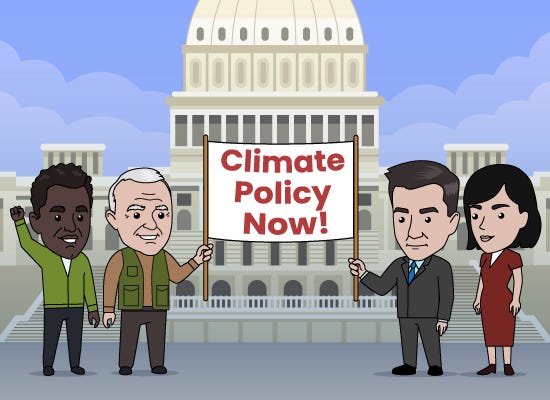Good. Just Not Good Enough.
The Problem with Voluntary Corporate Climate Commitments
It’s never easy for environmentalists to succeed. And I never want to be ungrateful for everyone’s hard work. Nor take for granted the significant progress we’ve made.
But when I see smoke, I ring the alarm bell.
The last few years have been a golden era for voluntary corporate commitments to reduce carbon emissions. Some two-thirds of the world’s largest companies now have net-zero targets. This is a remarkable feat and a credit to all who fought so hard to get us here.
But will these targets be achieved? Can we count on corporations to do as they’ve promised?
It’s doubtful. Voluntary commitments are a fickle ally — weak in resolve and not well-positioned to weather tough storms.
We’ve warned about this before. Back in 2021, we were concerned with the inevitable increase in costs from decarbonization, particularly for carbon-intensive and lower-profit margin companies. We pointed out that it is always the case that some stakeholder group will need to bear such increased costs — either shareholders (by accepting lower profit margins) or customers (by paying higher prices). And there will always be a perverse advantage to those companies that choose not to decarbonize (or at least not to the same degree) and therefore get a competitive benefit from relatively lower costs.
But we’re now seeing an additional cause for concern beyond rising costs — political opposition. One glaring example: this Bloomberg article on how companies are retreating from DEI commitments. Another: this New York Times piece about banks pulling out of climate coalitions. And this is happening during a strong economy, a booming stock market, and a generally supportive Congress and White House. I can only imagine what will happen to voluntary commitments in more challenging economic or political times.
Voluntary commitments are great and provide important momentum for lasting change. But the stakes are too high to rely on anything non-binding. The most important thing we can do right now is to build on the momentum from voluntary action and push hard for policies that will make these initiatives mandatory and elect those who will support such initiatives. Companies admirably leading the way with their voluntary efforts to decarbonize have the opportunity to join forces with all climate-concerned citizens to make this happen. That’s the best way to ensure that when the going gets tough, the commitments don’t go right out the door.
Onward,



Having worked with businesses for the past 20 years on voluntary commitments, I can speak from experience that this is true. Only policy changes will create sustained changes to business practices. By creating clear policies are enabling businesses to do what they do best in a level playing field. But this is not only about what businesses should NOT being doing, it is about incentivizing them to what we want them to do. Look at the tremendous burst of activity, innovation, and investment the Inflation Reduction Act has sparked.
100%!!!
Chief Scientific Officer of Exxon knew in late 70s about harmful effects of fossil fuels and was ready to take action. Same with other oil company leaders. Then they got politicians of a certain party to "collaborate" by realizing that since no one could predict precisely what would happen when, as opposed to knowing big picture directionality, they could cast doubt on predictions and delay delay delay. Until the present day.
We need Congress to wake up and pass legislation that sunsets fossil fuel subsidies and gives tax incentives to companies that take real action vs. soft commitments.